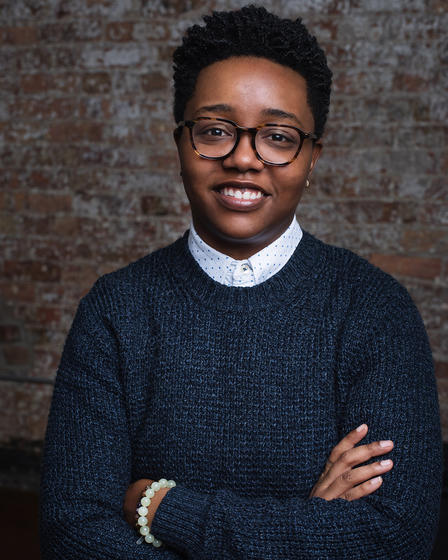Shá Norman (They/She) joins George Mason University with over ten years of experience in program administration in education non-profits and higher education institutions.
While teaching students performing arts and creative writing across the Chicagoland area, they became deeply aware of the inequities students with marginalized backgrounds faced in education systems. This led to their passion for not only the work of advocacy for equity in education but also administering the programs and supports that insulate marginalized students and educational opportunities that support the professional development of administrators, faculty, staff, and program instructors.
To help the CVPA community get to know Shá, we asked them about their goals at Mason, their art, and the best advice they have received. Read on to learn more and help us offer Shá a warm welcome!

What attracted you to Mason and this role within Mason in particular?
As a creative and educator, the opportunity to dialogue and be in community with creatives and educators through the implementation of diversity, equity, inclusion, and accessibility supports and resources can only be described as purposeful for me. I was drawn to the position because it marries my passion for DEIA in higher education with my passion for the arts and working with artists/creatives. While going through the interview process, my awareness deepened of how special the GMU CVPA community is and how committed CVPA is to diversity, equity, and inclusion. I am very excited to begin this collaborative adventure with each of you.
Who has influenced you most when it comes to how you approach your work?
bell hooks. My understanding of myself and my place and purpose in society flows from the wisdom of bell hooks. Much of my methodology toward DEIA comes from bell hooks offerings such as Teaching to Transgress and Teaching Community to name a couple.
What’s the biggest misconception people have about your position?
A good amount of my past experiences in equity work is ‘fixer’ or reacting to harm internal and external to the organization/institution through education interventions, programs, and initiatives. I’ve noticed an absence of proactive dialogue and intentionality in responding to harm. I believe more dialogue centering how to be in community with one another through the lens of our experiential knowledge can assist in creating a culture of inclusion and belonging that uplifts us all. I believe each of us holds a piece of the answer to our collective institutional and societal challenges, and it is our social responsibility to work toward inclusive freedom through inclusive practices.
What’s the best advice you were ever given? Who was it from?
I think of advice as insights. The best insight I’ve been given is the insight of interconnectedness from Thich Nhat Hahn. If you have a conversation with me long enough you will most likely hear me talk about interconnectedness. It’s very easy to ‘other’ in our society. We ‘other’ difference whether that difference is identity, ideology, cultural norms, etc. However, when we understand that all things are interconnected, we can see difference through the lens of appreciation and extended wisdom; then those differences become more valuable to us as a collective community.
What are some topics or conversation starters you love that will help people get to know you?
My answer may be a bit polarizing; on one hand, I enjoy a good philosophical conversation about life, love, and all the in-between, while on the other hand I also really enjoy a good conversation dissecting the latest episode of Real Housewives of Potomac and other such reality tv shows.
What kind of relationship do you have with the arts? What are you looking forward to exploring about the arts within CVPA?
Being a creative is a salient identity for me and much of how I approach life, through the lens of curiosity. As a practitioner, I am a percussionist and writer. I was absolutely a choir, theater kid. I’ve had the opportunity to do some improv and acting across Chicago, primarily through working with Playmakers Laboratory Theatre. In my everyday life, creativity is how I approach my work and grounds my ability to be flexible and adaptable. I also really enjoy cooking and cultivating a good food experience.
I am most excited to experience the artistic work of CVPA faculty, staff, and students. I’ll be on the lookout for those galleries, theater, and concert invitations.
Do you have any hidden talents or hobbies?
I love humor and I’ve been told I’m funny. It’s also worth knowing that I laugh at 100% of my own jokes. Additionally, during the pandemic, I discovered my deep joy for puzzles.
